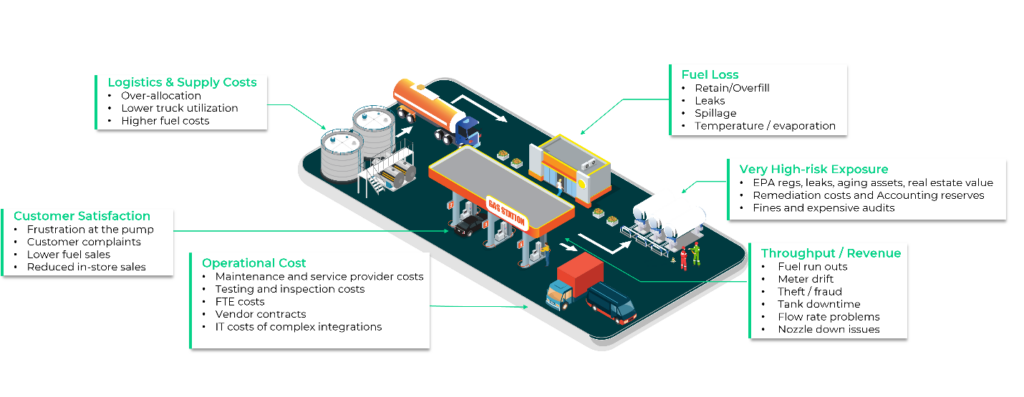
A Platform That Can Do It All
The fuel industry faces a staggering challenge—fragmented systems and siloed operations contribute to up to $1 billion in potential annual savings that go unrealized due to inefficiencies. Traditional fuel management systems lack the integration and visibility needed to optimize operations. Moreover, inefficiencies across the supply chain drive up operational costs by up to 30%, further straining profitability.
Traditional fuel management systems often fall short, forcing operators to work in data silos and rely on fragmented tools. This hinders efficiency and collaboration, leading to hidden inefficiencies that inflate costs and frustrate consumers. To stay competitive, fuel operators must gain efficiencies and be agile in their operations—making integrated fuel analytics platform solutions not just an option, but an urgent necessity.
The downstream fuel journey, from terminal to pump, is plagued by blind spots and information gaps.

Complex downstream fuel supply chain
These critical disconnects hinder efficiency across the fuel industry:
To address these challenges, fuel industry leaders must embrace technology integration. In a conventional procurement-to-payment workflow, the sheer volume of manual touchpoints—often exceeding a hundred—leads to inefficiencies, slower processes, and increased error rates. These inefficiencies inflate costs and frustrate consumers. A unified fuel analytics platform that spans the entire supply chain, from rack to dispenser, is essential for achieving true efficiency and optimization.
Workflow automation is key to driving these inefficiencies down. With APIs and technology integration, manual processes like tank measurements and invoice matching are replaced by smooth data connections, centralizing multiple applications for a streamlined view of all operations. This end-to-end visibility enables operators to act on real-time data, flagging disparities and resolving issues before they impact the bottom line.
Titan Cloud’s Fuel Analytics and Asset Optimization platform is the industry’s leading solution for addressing these challenges. By connecting all critical aspects of fuel operations, Titan Cloud empowers businesses with real-time visibility and data-driven decision-making.
With Titan Cloud technology integration, fuel operators can:
Automation moves orders through the procurement-to-payment workflow efficiently, transforming enterprise-wide operations and adding substantial value to their bottom line.
After a significant acquisition, a major fuel and convenience retailer operating over 500 sites faced persistent challenges with delivery reconciliation and operational efficiency. Having previously worked with Leighton O’Brien (now part of Titan Cloud) for compliance, they turned to the fuel management leader for a comprehensive solution that automated ATG measurements and enhanced leak detection.
By integrating Titan Cloud’s fuel analytics platform, the retailer achieved a 64% reduction in tank gauge calibration variances and improved automatic BOL reconciliation by 5%. This streamlined process reduced investigations by 15%, significantly boosting operational efficiency.
Leveraging Titan Cloud’s AI-powered wetstock management, the retailer replaced manual variance tracking with high-frequency data capture, resulting in pinpoint accuracy and fewer fuel losses. This data-driven approach also enabled remote diagnostics, crucial for managing their widespread sites. The results speak for themselves: a 64% reduction in inventory variances and accepted deliveries boosted to 99%.
Titan Cloud’s streamlined implementation and robust technology provided the retailer with a solution that not only saved time and money but also enhanced operational effectiveness across their network.
Titan Cloud’s platform is at the forefront of fuel management, revolutionizing supply chain operations with smart algorithms and artificial intelligence (AI). Rather than merely anticipating the future, Titan Cloud is actively shaping it with real-time, actionable solutions. With AI-driven insights, fuel operators can:
The fuel industry’s future hinges on its ability to adapt to a rapidly changing landscape. By embracing technology integration solutions like Titan Cloud, leaders can unlock hidden potential, improve efficiency, and drive profitability.
Titan Cloud is poised to lead the way, helping fuel operators navigate the challenges of the modern fuel industry and achieve sustainable success. Learn more by talking to one of our solutions consultants today.
